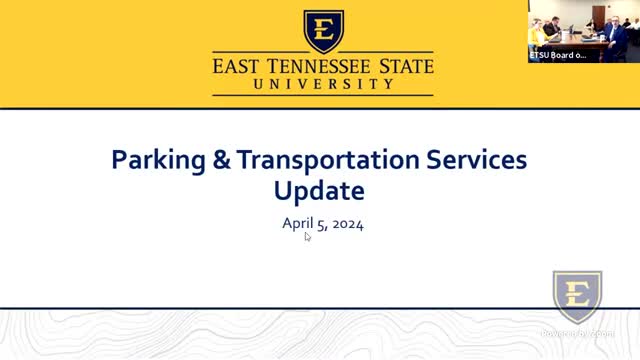East Tennessee State University explores parking efficiency in master planning update
April 05, 2024 | East Tennessee State University, Public Universities, School Districts, Tennessee

This article was created by AI summarizing key points discussed. AI makes mistakes, so for full details and context, please refer to the video of the full meeting. Please report any errors so we can fix them. Report an error »

In a recent virtual meeting of the East Tennessee State University (ETSU) Special Called Board of Trustees Finance and Administration Committee, significant discussions centered around the university's parking and transportation services. This meeting was part of a broader master planning process aimed at addressing various campus needs, including academic buildings, enrollment, and housing. However, parking emerged as a critical issue that has garnered attention from both the administration and the campus community.
The presentation highlighted a comprehensive study conducted by a consultant to evaluate the efficiency and effectiveness of ETSU's parking infrastructure. Key findings revealed a concerning disparity between parking revenue and maintenance costs. It has been over six years since ETSU last raised parking fees, while the costs associated with maintaining parking facilities have surged, in some cases tripling or quadrupling. This financial strain has led the university to rely on reserves to avoid passing costs onto students during uncertain times, such as the pandemic.
The analysis also indicated that while there are over 1,500 empty parking spaces on campus during peak times, the issue is not merely about the number of spaces available. The study pointed out that many of these empty spaces are located in less utilized lots, while the parking garage remains nearly full. This suggests that the distribution and accessibility of parking spaces may need reevaluation to better serve the campus community.
Comparative data from other universities in the state revealed that ETSU's parking fees are significantly lower than those of its peers. For instance, while graduate students at Vanderbilt University pay $540 per semester for parking, ETSU students currently pay only $1.40. This raises questions about the sustainability of ETSU's parking model and whether adjustments are necessary to align costs with the growing demands of the campus.
The committee also discussed the potential for enhancing accessibility, particularly for students with disabilities, by increasing the number of reserved spaces. The ongoing master planning process aims to address these issues and will be presented to the board in September, indicating that the discussions are still in a fluid state and subject to further development.
In conclusion, the meeting underscored the importance of reevaluating ETSU's parking and transportation services in light of rising costs and changing campus dynamics. As the university prepares for future growth, the decisions made in this area will have lasting implications for students, faculty, and the overall campus experience. The committee's next steps will involve further analysis and the development of a comprehensive plan to address these challenges effectively.
The presentation highlighted a comprehensive study conducted by a consultant to evaluate the efficiency and effectiveness of ETSU's parking infrastructure. Key findings revealed a concerning disparity between parking revenue and maintenance costs. It has been over six years since ETSU last raised parking fees, while the costs associated with maintaining parking facilities have surged, in some cases tripling or quadrupling. This financial strain has led the university to rely on reserves to avoid passing costs onto students during uncertain times, such as the pandemic.
The analysis also indicated that while there are over 1,500 empty parking spaces on campus during peak times, the issue is not merely about the number of spaces available. The study pointed out that many of these empty spaces are located in less utilized lots, while the parking garage remains nearly full. This suggests that the distribution and accessibility of parking spaces may need reevaluation to better serve the campus community.
Comparative data from other universities in the state revealed that ETSU's parking fees are significantly lower than those of its peers. For instance, while graduate students at Vanderbilt University pay $540 per semester for parking, ETSU students currently pay only $1.40. This raises questions about the sustainability of ETSU's parking model and whether adjustments are necessary to align costs with the growing demands of the campus.
The committee also discussed the potential for enhancing accessibility, particularly for students with disabilities, by increasing the number of reserved spaces. The ongoing master planning process aims to address these issues and will be presented to the board in September, indicating that the discussions are still in a fluid state and subject to further development.
In conclusion, the meeting underscored the importance of reevaluating ETSU's parking and transportation services in light of rising costs and changing campus dynamics. As the university prepares for future growth, the decisions made in this area will have lasting implications for students, faculty, and the overall campus experience. The committee's next steps will involve further analysis and the development of a comprehensive plan to address these challenges effectively.
View full meeting
This article is based on a recent meeting—watch the full video and explore the complete transcript for deeper insights into the discussion.
View full meeting
